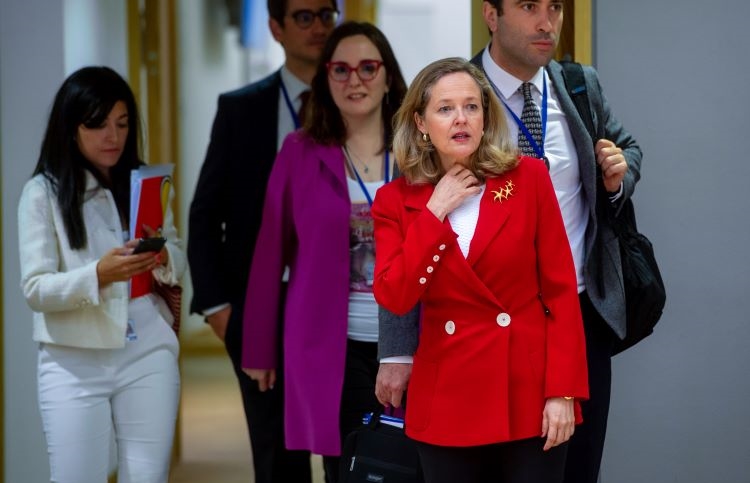Eduardo González
The Spring Economic Forecast 2022, published yesterday by the European Commission, warns that full recovery from the COVID-19 crisis will be delayed in Spain until mid-2023 due to the economic consequences of Russia’s military aggression in Ukraine and despite the “limited direct exposure of the Spanish economy” to these two countries.
The Commission published yesterday the so-called “2022 European Semester Spring Package”, according to which “the EU economy to continue growing in 2022 and 2023”. “However, while the EU economy continues to show resilience, Russia’s war of aggression against Ukraine has created a new environment, exacerbating pre-existing headwinds to growth, which were previously expected to subside,” warns the document, which also poses additional challenges to the EU economies related to security of energy supply and fossil fuel dependency on Russia.
In the chapter dedicated to Spain, the report recalls that “the COVID-19 pandemic put an end to six years of strong economic growth and a phase of dynamic job creation.” However, it continues, “after a moderate expansion in the first half of 2021, the recovery gained momentum during the second half of the year, due to the strength of the labor market and the recovery of tourism”. Therefore, the document asserts, “the implementation of the Recovery and Resilience Plan (PRR) is expected to increase the resilience of the Spanish economy” and that “the economy will improve its cost competitiveness during the recovery despite strong inflationary pressures.”
However, the spring package warns that “full recovery from the COVID-19 crisis will be delayed due to the economic consequences of Russia’s military aggression on Ukraine” despite “the limited direct exposure of the Spanish economy.”
“Direct economic exposure to Russia and Ukraine is limited and lower than for other Member States,” the Commission notes. “Trade dependence and value chain interrelationships with Russia and Ukraine are small overall and limited to a few sectors,” and, compared to other products, trade figures and shares in total Spanish imports are only significant for Russian oil and gas (“although lower than the corresponding EU average”) and cereals and sunflower oil from Ukraine. Also, although the number of Russian tourists had increased significantly before the pandemic, particularly in some areas of the Mediterranean coast, “they still represent overall a small proportion at the global level”.
Moreover, the level of foreign direct investments made by Russia is negligible, while the presence of Spanish companies in these countries is limited to a few exceptions in the infrastructure and retail sectors. Likewise, the exposure of Spanish financial institutions, which is already low compared to that of other EU countries, is currently very limited due to the sanctions adopted in 2014 following Russia’s annexation of the Crimean peninsula. This also explains the low number of home purchases made by Russian citizens in Spain.
Despite all this, and the low dependence on energy supplies from Russia, “further price rises from already high levels put considerable pressure on consumer prices and production costs”. In the case of Spain, the share of energy imports from Russia is relatively low compared to other EU countries, especially in the case of gas and oil. “However, despite having a very diversified set of oil and gas suppliers,” the overall dependence on foreign energy supplies makes the Spanish economy “particularly sensitive to price variations in world markets.”
Full recovery is delayed to mid-2023
As a result, the Commission believes that GDP growth in Spain will slow in the first half of 2022 and gain momentum in the second half of the year, when price rises and supply problems are expected to begin to subside. However, both variables are expected to remain at a high level throughout the forecast period. As a result, full recovery to the pre-pandemic level of GDP is expected to be delayed until mid-2023.
In its recommendations, Brussels urges Spain to “ensure prudent fiscal policy” and “adjust its current expenditures to the changing situation” so that “temporary and targeted assistance” to households and businesses most affected by energy price hikes and to “people leaving Ukraine” can be maintained. It also recommends the Government to “proceed with the implementation of its Recovery and Resilience Plan, in line with the milestones and targets included in the Council Implementing Decision of 13 July 2021”; to increase “public investment in the areas of green and digital transition and security of energy supply” through EU funds; and to reduce “overall dependence on fossil fuels” by accelerating the development of renewable energy.
Calviño at the Eurogroup
On the other hand, the First Vice-President and Minister for Economic Affairs and Digital Transformation, Nadia Calviño, welcomed yesterday in Brussels the European Commission’s proposal to extend by one year, until 2023, the suspension of EU fiscal rules in order to facilitate the response of Member States to the economic consequences of the pandemic and the war in Ukraine. The “escape” clause was active in 2021 and 2022 and will remain so in 2023. “Spain has been advocating a review and update of those fiscal rules as soon as possible” before they come back into force, so “it is positive that this escape clause is extended for another year,” she told the press before her participation in the Eurogroup meeting.
The Vice-President also announced that Spain will use part of the 86 billion euros granted to Spain through loans under the recovery plan (the remaining 69.5 billion were transferred to non-repayable funds) to boost reforms in the energy sector. Last week, the Commission urged all Member States to make use of these soft loans to wean themselves off Russian energy dependence.







